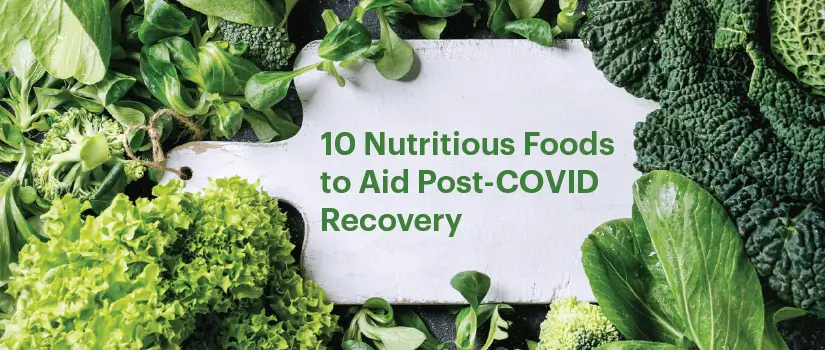-
Doctors
-
Specialities & Treatments
Centre of Excellence
Specialties
Treatments and Procedures
Hospitals & Directions HyderabadCARE Hospitals, Banjara Hills CARE Outpatient Centre, Banjara Hills CARE Hospitals, HITEC City CARE Hospitals, Nampally Gurunanak CARE Hospitals, Musheerabad CARE Hospitals Outpatient Centre, HITEC City CARE Hospitals, Malakpet
HyderabadCARE Hospitals, Banjara Hills CARE Outpatient Centre, Banjara Hills CARE Hospitals, HITEC City CARE Hospitals, Nampally Gurunanak CARE Hospitals, Musheerabad CARE Hospitals Outpatient Centre, HITEC City CARE Hospitals, Malakpet Raipur
Raipur
 Bhubaneswar
Bhubaneswar Visakhapatnam
Visakhapatnam
 Nagpur
Nagpur
 Indore
Indore
 Chh. Sambhajinagar
Chh. SambhajinagarClinics & Medical Centers
Book an AppointmentContact Us
Online Lab Reports
Book an Appointment
Consult Super-Specialist Doctors at CARE Hospitals
10 Nutritious Foods to Aid Post-COVID Recovery
Updated on 21 May 2021

Table of Content
Eating right has never been more important than now with COVID-19 affecting different people across all age groups. While the nations across the world are struggling to fight off the challenges the virus is posing, the ultimate prevention factor narrows down to the type of foods we consume. Even after getting cured from the virus, the journey to bounce back to normal life can be quite enervating and this may continue for weeks. Hence, it is a must to have a nutritious and healthy diet during the recovery period. The foods we consume play an important role in COVID-19 prevention and management. Optimal nutrition triggers back an immune response, providing the body with the fuel it needs to mend itself. The right balance of proteins, vitamins, minerals, and other essential nutrients works to bring back much-needed stamina and energy.
Ten Food Groups to Help Your Body Post-Covid for Recovery:
The following are 10 food groups that can help your body with healthy eating for Post-Covid recovery:
- Nuts: A handful in quantity with plenty of nutritional quality! Nuts are rich sources of proteins, healthy unsaturated fats, vitamins, minerals, and fibre, that greatly support the immune system. These include almonds, walnuts, pistachios, peanuts, chestnuts, and cashews which are best eaten before breakfast.
- Citrus fruits: Oranges, limes, and grapefruits are some of the most commonly known citrus fruits. They are rich in Vitamin C which not only improves resistance but also provides the body with the strength to bounce back to a normal, active life. [1] [2] These can be eaten at any time during the day, preferably as a snack in between major meals.
- Green leafy vegetables: Vegetables that are green in colour and leafy in texture are excellent sources of iron, calcium, and essential vitamins such as Vitamin C and K. This composition provides important chemical stimuli to immune cells which help them carry out their functions properly. Some great green leafy vegetables include spinach, cabbage, lettuce, and kale, which are a great supplement to lunch and even dinner.
- Tea: Green tea and black tea[3] [4] are well known for their antioxidants that have protective effects on our immune systems. They are best enjoyed during the morning hours. However, avoid drinking them a few hours before going to bed as it can potentially interfere with sleep due to their caffeine content.
- Spices: Garlic, ginger, and turmeric have an excellent reputation for their use when we are down with a viral fever or even a small common cold. The reason behind their popularity especially in Indian households is due to their anti-inflammatory properties that, activate prime components of the immune system. All of these spices can be included as part of your meal preparations at lunch or dinner.
- Berries: Similar to the teas listed above, berries are also rich in antioxidants that have anti-inflammatory properties. Adding to this, some studies have hypothesized that extracts from berries can help block flu viruses. Some berries that should be in your berry basket include acai berry, elderberry, etc. Similar to nuts, berries work great as a snack to munch on whenever you’re hungry throughout the day. Alternatively, they can be enjoyed as a smoothie before or after physical exercise.
- Fish: Salmon, king mackerel, tuna, and cod are a few examples of fish that are rich in Vitamin A, as well as Vitamin Bs (B2, B6, B12) - all of which help in reducing inflammation and assisting with the smooth functioning of the immune system. Simultaneously, they help with the production of red and white blood cells to keep the body continuously fighting against infections.
- Lentils/daal: Lentils are one of the few sources of protein for vegetarians. Beyond just high protein, they increase blood haemoglobin levels and feed the immune system with much needed iron. Most daals are an excellent addition to daily nutrition, attributed to their presence in Indian households. This includes masoor daal, chana daal, urad daal, and moong daal, which make for a nourishing part of lunch. [5] [6]
- Fibre: The role of fibres for the immune system is best described with this excerpt - “fibre changes immune cells from being pro-inflammatory warrior cells to anti-inflammatory peacekeeper cells”. They help the immune system recover from infections faster. Fibres are categorized into 2 types: soluble (oats, nuts, seeds, beans, etc.) and insoluble (brown rice, wheat berries, rye, fruits & vegetables, etc.). Both sources of fibre should be consumed generously either as a snack or as part of lunch/dinner.
- Water: The water that we drink every day is crucial for our immune system as a whole. It benefits our body in three distinct ways: it helps absorb nutrients that enter the bloodstream, it supports the health of mucous membranes and contains specialized white blood cells that help the body fight off infections.
Just one of the above foods isn’t enough to assist with recovery. A healthy and balanced diet is a culmination of nutritious choices made consistently. You can also consult the best dietician in India to get their assistance in the matter. They will draw a healthy Covid-19 recovery diet chart for you. In addition to good nutritional habits, make sure to rest adequately, incorporate some physical activity, and be patient. Recovery is a gradual process that will take time. Stay safe, stay healthy.

ENQUIRY FORM
SELECT CATEGORIES
-
Neurosciences (16)
-
Neurology (38)
-
Neurosurgery (14)
-
Orthopaedics (48)
-
Oncology (33)
-
Obstetrics and gynecology (52)
-
Pulmonology (23)
-
Urology (20)
-
Nephrology (13)
-
Psychiatry (7)
-
Dietetics and Nutrition (111)
-
General Medicine (63)
-
Cardiac Sciences (32)
-
Vascular & Endovascular Surgery and Interventional Radiology (15)
-
Gastroenterology (46)
-
Endocrinology (23)
-
Plastic Surgery (10)
-
Critical Care Medicine (5)
-
COVID-19 (16)
-
Dermatology (16)
-
Emergency Care (1)
-
Ophthalmology (4)
-
Pediatrics (14)
-
Laparoscopic and Bariatric Surgery (8)
-
ENT (15)
-
Kidney Transplant (1)
-
Liver Transplantation and Hepatobiliary Surgery (5)
-
General Surgery (3)
-
Internal Medicine (5)
-
Medicine Information
Black Fungus COVID-19
Keeping children safe during the second and third wave of COVID-19
YOU MAY ALSO LIKE
RECENT BLOGS
-

Rotablation Angioplasty: Benefits, Treatments, And Recovery Time
6 February 2026
Read More
-

What Is The Difference Between IUI and IVF?
6 February 2026
Read More
-

Pulmonary Stenosis: Symptoms, Causes, Diagnosis and Treatments
6 February 2026
Read More
-

Difference between Angioplasty and Angiography
6 February 2026
Read More
-

Hemoptysis (Coughing Up Blood): Causes, Treatment and Home Remedies
2 February 2026
Read More
-

Leg Weakness: Causes, Symptoms and Treatment
9 January 2026
Read More
-

Back Pain After C-Section: Causes and Home Remedies
9 January 2026
Read More
-

Belly Button Pain (Periumbilical Pain): Causes, Treatment and When to See a Doctor
9 January 2026
Read More
Have a Question?
If you cannot find answers to your queries, please fill out the enquiry form or call the number below. We will contact you shortly.














